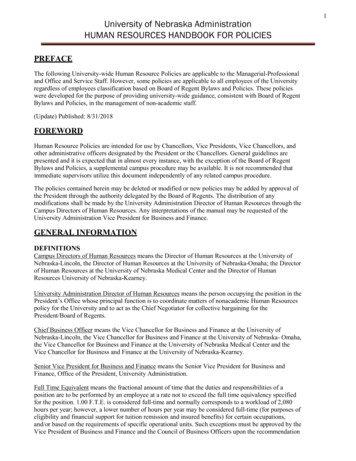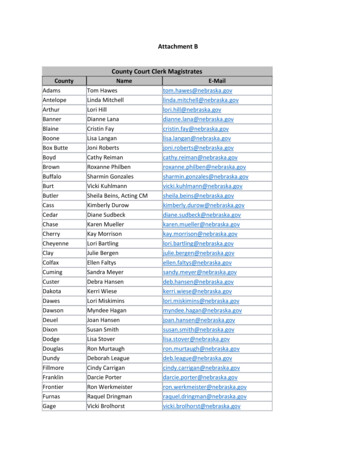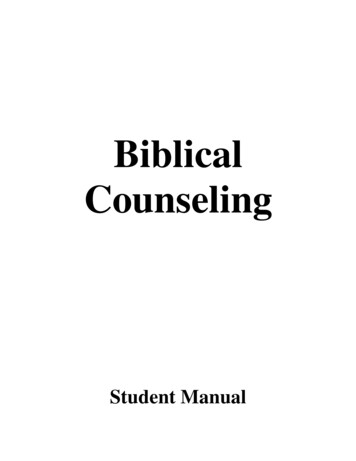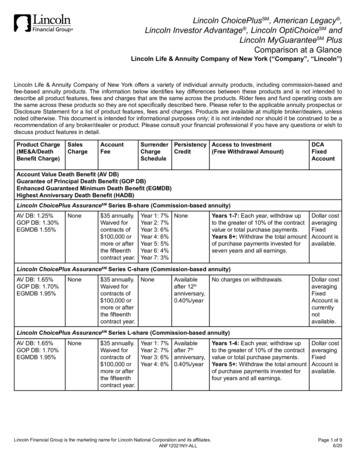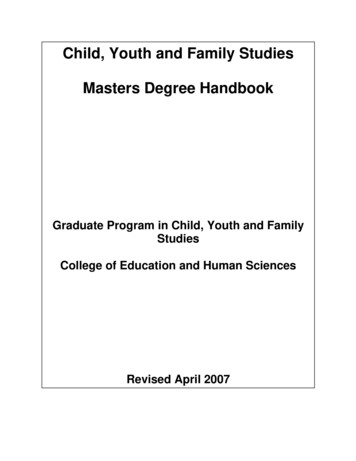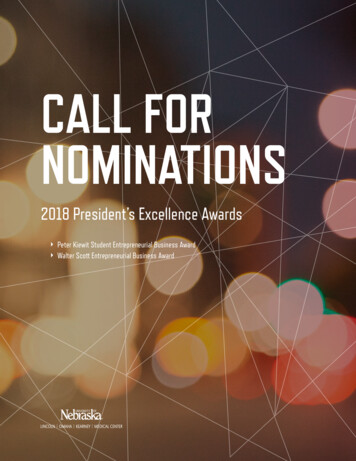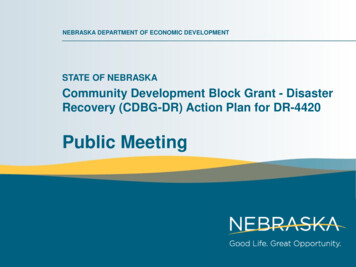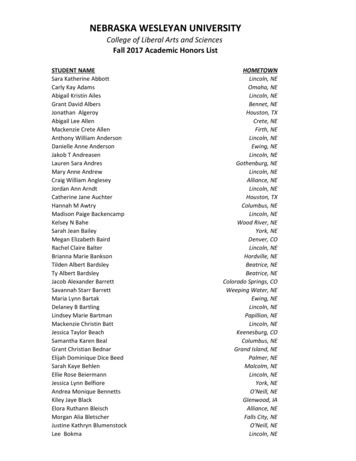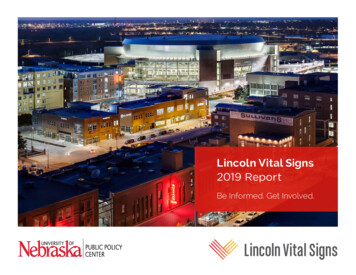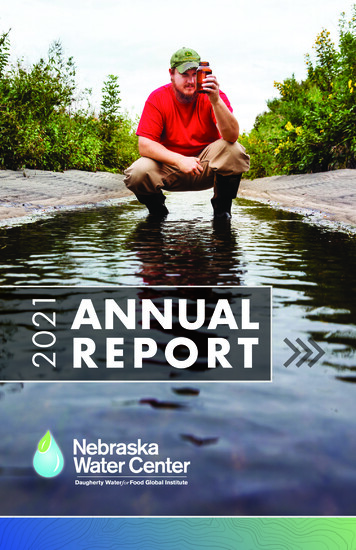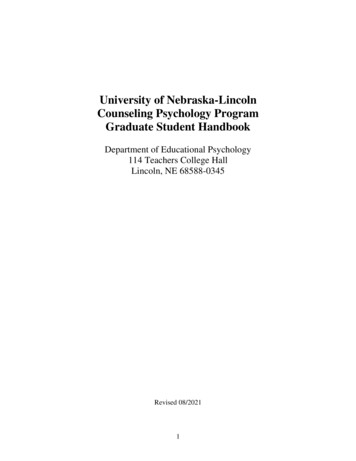
Transcription
University of Nebraska-LincolnCounseling Psychology ProgramGraduate Student HandbookDepartment of Educational Psychology114 Teachers College HallLincoln, NE 68588-0345Revised 08/20211
Table of ContentsGENERAL INFORMATION . 4Introduction . 4Graduate Studies . 5Registration Procedures . 5Quick Reference Guide to the Major University Facilities/Offices . 5Residency Procedures . 6Membership in Professional Organizations . 7COUNSELING PSYCHOLOGY PROGRAM . 8Master of Arts Program . 8Doctoral Program . 9Counseling Psychology Training Values . 14Disclosure of Education/Training Outcomes . 16Grievance Procedures . 16Remediation Procedures and Termination from the Program . 17FINANCIAL ASSISTANCE . 20Loans and Need-Based Application Process . 20Fellowships . 21Teaching & Research Assistantships . 22Research Grants . 22CAMPUS RESOURCES . 23Campus Information . 23Campus Libraries . 23Facilities and Services. 23Health Services . 25Graduate On-Campus Housing . 26Entertainment . 26Campus Recreation and Fitness Programs . 27Career Services . 28Women’s Center . 28LGBTQA Center . 28Services for Students with Disabilities (SSD) . 28Center for Advocacy, Response & Education (CARE) . 29EXTRACURRICULAR ORGANIZATIONS . 30Diversity and Ethnic Minority Affairs Committee (DEMAC) . 30Student Organizations . 30Counseling Psychology Student Organization (CPSO) . 30APPENDIX A - DOCTORAL PROGRAM DESCRIPTION. 31Comprehensive Examination . 32Waiving a Course/the Equivalency Process . 33Required Coursework for the Doctoral Degree . 33Research Requirement other than Dissertation . 37Advanced Integrative Knowledge. 37Counseling Psychology Core Faculty . 38Counseling Psychology Adjunct Faculty . 392
Supporting Faculty - Department of Educational Psychology . 39Supporting Faculty - Department of Psychology. 40APPENDIX B - DOCTORAL POST-BACHELORS MASTER’S PROGRAM . 41Doctoral Track Master of Arts in Counseling Curriculum . 41Tentative Post-Bacc Master’s Sequence for Doctoral Students . 42APPENDIX C - MASTER’S OF ARTS PROGRAM DESCRIPTION . 43Master’s of Arts Specialization: Community Counseling . 44Master’s of Arts Specialization: School Counseling . 45Non-Teaching School Counseling Endorsement Requirements . 46APPENDIX D - PROCEDURES AND POLICIES REGARDING COMPREHENSIVEASSESSMENTS OF STUDENT COMPENTENCIES WHILE ENROLLED IN THECOUNSELING PSYCHOLOGY GRADUATE PROGRAM . 47APPENDIX E - COMPETENCY BENCHMARKS IN PROFESSIONAL PSYCHOLOGYRATINGS FORM . 533
Counseling Psychology ProgramUniversity of Nebraska-LincolnGENERAL INFORMATIONIntroductionWelcome to the University of Nebraska-Lincoln Counseling Psychology program! TheUniversity of Nebraska-Lincoln (UNL) is located in the city of Lincoln and has two campuses.The City Campus is the main campus and is home to the Colleges of Architecture, Arts andSciences, Business Administration, Engineering and Technology, Fine and Performing Arts,Journalism and Mass Communication, Education and Human Sciences, and the University-wideGraduate College. The East Campus of UNL accommodates the Institute of Agriculture andNatural Resources, the Law College, and the College of Dentistry. Other campuses in theUniversity of Nebraska system include the University of Nebraska at Omaha (UNO), theUniversity of Nebraska Medical Center (UNMC) in Omaha, and the University of Nebraska atKearney (UNK).The Counseling Psychology program within the Department of Educational Psychology of theCollege of Education and Human Sciences (CEHS) is housed in Teachers College Hall on theCity Campus, and offers master degrees (M.A.) in community and school counseling, as well asa doctor of philosophy (Ph.D.) degree. Admissions to all programs are handled through theAdmissions Coordinator, located within the Department in 114 Teachers College Hall. TheAdmissions Coordinator is Edith Reza-Martinez and can be reached by phone at (402) 472-1050or by email at erezamartinez2@unl.edu. The program address is:Counseling Psychology ProgramDepartment of Educational Psychology114 Teachers College HallUniversity of Nebraska-LincolnLincoln, NE 68588-0345Phone: (402) 472-2223The masters program in counseling is oriented toward the practice of counseling in eithercommunity or school settings. The community counseling specialization provides a combinationof clinical and research training, preparing students for work in a variety of counseling settings,as well as for continuation on to doctoral studies should one pursue this furthering of educationand training. The school counseling specialization prepares individuals to work with youngpeople in the context of elementary, middle, and/or high school settings.The doctoral program in counseling psychology is based in the scientist-practitioner trainingmodel. The goal is to train psychologists with specialized expertise in counseling theory,research, and practice. The program provides a balanced emphasis in (a) the scientific study ofcounseling research and (b) on the practice of counseling and psychotherapy in diverse settingswith diverse populations. Graduates of our doctoral program enter both academic settings and4
professional practice arenas. The doctoral program has been fully accredited by the AmericanPsychological Association since 1959 — as such, it is among the five oldest accredited programsin the country! The program most recently received full re-accreditation in 2013, with the nextaccreditation review scheduled for 2020. For information about the accreditation of our program,individuals can contact the Committee on Accreditation of the American PsychologicalAssociation by phone at (202) 336-5979, online at www.apa.org/ed/accreditation or via email toapaaccred@apa.org.Graduate StudiesThe Office of Graduate Studies is the central administration office that directly oversees allgraduate programs in the university. Graduate Studies plays two primary roles: (a) studentadvising services and (b) the establishment of standards and procedures related to fulfilling thesisand dissertation requirements. The website for Graduate Studies ishttps://www.unl.edu/gradstudies/home. Degree requirements for both the masters and doctoraldegrees are clearly described on the Graduate Studies degrees).Thesis and dissertation guidelines are detailed available in the Guidebook for Preparing Thesisor Dissertation uidelines). Becoming familiarwith Graduate Studies and its services provides a framework within which students cansystematically progress toward their degree requirements at UNL. The Graduate Studies policiescan be found at uate/.Registration ProceduresThe Schedule of Classes is published online every semester by the Office of the UniversityRegistrar. MyRED is the University of Nebraska-Lincoln’s online registration system, and this iswhere you can see the courses offered each term. This system allows you to register for classes,drop and add courses, see a listing of your current classes, and change grading options. MyREDis accessed at https://myred.nebraska.edu. Thorough instructions on the use of the MyRED canbe found through the UNL Registrar website: https://www.unl.edu/about myred/node/1.The Office of the University Registrar is open during fall and spring semesters Monday throughFriday, 8:00 a.m. to 5:00 p.m. (CST). The UNL Graduate Bulletin is a helpful reference forplanning your schedule, as it contains detailed information about the University, as well ascourse descriptions.Quick Reference Guide to the Major University Facilities/OfficesFor a quick reference guide, the following is a list of the addresses and phone numbers ofselected major University offices. Many of these will be discussed in more detail in subsequentsections of the Graduate Student Handbook. In the U.S. and Canada, all offices below can bereached by calling UNL’s toll-free number [(800) 742-8800] and asking for the specificdepartment. Most UNL offices are open between 8:00 a.m. and 5:00 p.m. (CST), Mondaythrough Friday. All written correspondence should be addressed to the appropriate person anddepartment, University of Nebraska-Lincoln, Lincoln, NE 68588.5
Educational Psychology Department: Department of Educational Psychology, 114 TeachersCollege Hall, University of Nebraska-Lincoln, Lincoln, NE, 68588-0345; (402) 472-2223Graduate Studies: 1100 Seaton Hall, P.O. Box 880619Admissions: (402) 472-2878General Information: (402) 472-2875Office of the Registrar: 107 Canfield Administration Building, P.O. Box 880416; (402) 4723635Summer Sessions: 208 Canfield Administration Building; (402) 472-3567Scholarships & Financial Aid: 17 Canfield Administration Building, P.O. Box 880411; (402)472-2030Housing Information—Both on and off campus: UH, P.O. Box 880622, Lincoln, NE 685880622; (402) 472-3561International Affairs: 420 University Terrace, P.O. Box 880682; (402) 472-5358Jackie Gaughan Multicultural Center: 1505 S Street, Lincoln, NE 68508; (402) 472-7211Equity, Access, & Diversity Programs: 128 Canfield Administration Building, P.O. Box880437; (402) 472-3417Women’s Center: 340 Nebraska Union; (402) 472-2597LGBTQ Student Association Resource Center: 234 Nebraska Union; (402) 472-5644Services for Student with Disabilities: 132 Canfield Administration Building, P.O. Box880401; (402) 472-3787 or (402) 472-3785University Children’s Center: 2225 W St, Lincoln, NE 68503; (402) 472-2009University Health Center: 550 N 19th St, Lincoln, NE 68588; (402) 472-5000University Counseling and Psychological Services Center: 550 N 19th St, Lincoln, NE 68588;(402) 472-5000Student Legal Services: 335 Nebraska Union; (402) 472-3350Residency ProceduresAny nonresident student who wishes to establish residency for the purpose of paying in-statetuition must meet the requirements included in the residency policy voted on and approved by6
the University of Nebraska Board of Regents on April 30th, 1994. Establishing residency requires12 months residency in the state and demonstrating that you did not move to Nebraska for thesole purpose of attending an institution of higher education. Keep in mind that graduateassistantships come with tuition remission for up to 12 credit hours per semester, regardless ofresidency status. Additionally, some assistantships also provide up to 12 hours of tuitionremission during the summer sessions. Residency application forms and additional information isavailable in the Office of Admissions, 106 Canfield Administration Building. Office hours are8:00 a.m. to 5:00 p.m., Monday through Friday and 10:00 a.m. to 12:00 noon on Saturday;weekday summer hours are 7:30 a.m. to 4:30 p.m.Membership in Professional OrganizationsBecoming a member of a professional association related to Counseling Psychology is highlyencouraged and valuable for your training. Membership entitles you to attend local and nationalconferences, which serve as forums for exchanging the most current information in our fields, aswell as providing an opportunity for networking with colleagues. Membership also includessubscription to newsletters and journals published by the respective association/organization.These publications can help you stay current related to issues in counseling, and provideinformation about continuing education opportunities (e.g., workshops, seminars, conferences)and supplemental educational resources (e.g., texts, videos, tapes). Both conferences and journalsact as channels through which to enhance your professional development. It is important to notethat scholarly publications and presentations are often a major criterion in the selection ofmasters and doctoral students for admission and obtaining a postgraduate academic position.You are encouraged to take advantage of all opportunities of publishing and/or presentingscholarly work. Being a member of a professional organization increases exposure to the contentand style of current publications and thus facilitates your own publication efforts.All masters and doctoral students are expected to become student affiliate members of theAmerican Psychological Association (APA) and Division 17 (Society of CounselingPsychology). Graduate Student Affiliate Membership in APA includes a subscription to the APAMonitor (monthly magazine) and a subscription to the American Psychologist. Membership inthe Student Affiliates of Seventeen (SAS) of Division 17 includes a subscription to the SASNewsletter and the Division 17 Newsletter, and The Counseling Psychologist. As a member ofeither of these organizations, one can subscribe to the Journal of Counseling Psychology andother journals available through APA. Application forms for both professional organizations canbe found: http://www.apa.org/apags/join/ and http://www.div17.org/aboutscp/membership/#Student. Students are also encouraged to join Student Affiliates of Seventeen(SAS), which is the national membership organization for students associated with the Society ofCounseling Psychology, Division 17 of the American Psychological -affiliates-of-17-sas/).In addition to APA, you are encouraged to join other national and state associations relevant toyour professional interests, such as the American Association of Applied and PreventivePsychology, the American Psychological Society, the Nebraska Psychological Association, andthe Nebraska Counseling Association.7
COUNSELING PSYCHOLOGY PROGRAMMaster of Arts ProgramMaster’s students are expected to attend the program fulltime. The master’s of arts program hastwo tracks or areas of specialization: community counseling and school counseling. SeeAppendix C for the Master of Arts Program Description and suggested sequence of courses.Following Appendix C, displays requirements for the community counseling and schoolcounseling track. Students are admitted to one track or the other when they are accepted into theprogram. The community counseling track takes an average of 2 full years to complete,depending on the number of courses students elect to take per semester. The school counselingtrack is also designed to be completed in 2 years, with most classes taken during summersessions because most school counseling students are fulltime teachers and attend the programonly part-time.Assignment of Program AdvisorIndividual student program advisors are assigned after acceptance into the program on the basisof shared interests and advisor load. However, during your course of study, you may alter yourinitial research focus and/or decide that another faculty person would be more appropriate forguiding your program. If you wish to change advisors for these or other reasons, identify anotheradvisor who agrees to work with you, notify your original advisor, and record the change ofadvisor with the Program Director and with Edith Reza-Martinez (erezamartinez2@unl.edu).One of the duties of the Counseling Psychology Program Director is to facilitate the process ofchanging advisee/advisor assignments as needed.Required PaperworkFirst, complete the Memorandum of Courses Required for Candidacy for the Master’s Degreebefore you receive grades in more than one-half of the degree program. The Memorandum liststhe courses required for your degree and asks whether you are intending to complete a MAthesis. The Memorandum must be signed by your advisor and the chair of the EducationalPsychology Graduate Committee prior to submitting to the Office of Graduate Studies. Thesecond form is the registration form for comprehensive examinations. Third, the Application forDegree form must be submitted to the Office of Records at the outset of the semester in whichyou plan to graduate. The fourth required form is the Final Examination Report for Master’sDegree. It must be completed (including all signatures) and submitted to the Office of GraduateStudies at least four weeks before the end of the semester in which you plan to graduate. All ofthese forms are available online through the Office of Graduate Studies masters.Master’s students in counseling are considered Educational Psychology majors and allpaperwork should be prepared accordingly. You should retain all course syllabi, courseregistration forms, a copy of the Graduate Studies Bulletin for the year you were admitted, finalpracticum and field placement logs, and a record of graduate assistantships, volunteer work, andany other pertinent information or record of your educational experiences at UNL. Thisinformation and documentation is necessary in the event that specific content of your course ofstudy and overall training in the program must be validated at some future date for licensure8
purposes, employment applications, admission into a doctoral program, waiving of classes, andso forth. These materials are absolutely critical and should be retained indefinitely.Practicum Experience and Field PlacementThe practicum class involves three blocks of time each week. Individual supervision takes placefor one hour each week, and occurs in the context of a doctoral level supervision class. Groupsupervision and client contact normally occur on Wednesday evenings in our Clinic. Advancedpractica are offered in marriage and family therapy, child therapy, career counseling, and groupcounseling. The Field Placement in Counseling course is taken subsequent to the first practicumclass. You are responsible for arranging an off-site counseling experience that meets fieldplacement requirements; however, the program facilitates this process. There are a wide varietyof options for placement, including community mental health agencies and inpatient andoutpatient treatment facilities. The field placement requirement includes 300 hours of directclinical service, or 20 hours weekly for two full semesters. School counseling students mustcomplete their placements in the setting in which they plan to be endorsed (i.e., elementary ofsecondary). Each spring, the Counseling Psychology program organizes a luncheon for studentsand supervisors/directors of field placement sites to meet and discuss field placementopportunities. Students should contact the field placement instructor/supervisor the semesterbefore you plan to take the class for approval of your site and supervisor.Comprehensive Examination OptionAll masters students who are choosing to forgo the thesis option for completing the degree arerequired to take written comprehensive examinations toward the end of their program. Theseexams are administered three times a year and cover counseling, as well as two of the threefoundation areas: Development, Cognition and Learning, and Measurement and Statistics. Exampreparation should be kept in mind as you plan your program of study. You should initiate adiscussion of scheduling and preparation for your comprehensive examinations with youradvisor. Class notes and texts are materials that can be used to prepare for comps. Informationabout comprehensive exams and the registration form to sit for the exam can be found ve-exam/.Thesis OptionThe community counseling masters degree is offered with a thesis option. Students planning topursue a doctoral degree are encouraged to participate in one or more research projects duringtheir masters program (non-thesis research option), or to complete a research thesis (thesisoption). Requirements pertaining to completion of the thesis are detailed in the Graduate Studieswebsite ). Students electing the thesis optionmust be prepared to make a significant time commitment. Once your Memorandum of Courseshas been filed, switching from thesis to non-thesis option requires justification and may bedenied. Masters students enrolled in the school counseling track have no thesis requirement.Doctoral ProgramDoctoral students are expected to attend the program fulltime. Students are very stronglyencouraged to complete their course requirements during the first three years in the program,complete their dissertation and apply for internships during the fourth year, and spend their fifth9
year on internship. At a minimum, doctoral students must be fulltime in residence on campus forthree years with a fourth at a pre-doctoral internship site. Students accepted without theirmaster’s degree must complete all coursework required to obtain this degree in addition to theirdoctoral classes and often complete coursework in their first four years, complete theirdissertation and apply for internships during their fifth year, and spend their sixth year oninternshipAssignment of Program AdvisorStudents are assigned to program advisor at admission on the basis of shared research interests,and are expected to be active participants in their advisor’s research groups. Doctoral studentsare encouraged to continually assess their own interests in order to identify whether theirresearch and professional interests might be more appropriately guided by another facultymember. If you want to change advisors, discuss the matter with your current advisor, obtainpermission from your prospective new advisor, and record the change with the Program Directorand with Edith Reza-Martinez (erezamartinez2@unl.edu). It is the responsibility of theCounseling Psychology Program Director to facilitate changes in advisee/advisor relationships asneeded. Advisor changes should be made prior to the formation of your Doctoral SupervisoryCommittee; however, changes subsequent to that time are not prohibited.Doctoral Supervisory CommitteeThe Doctoral Supervisory Committee is the group who directly supervises your progress throughprogram milestones and has the ultimate authority over your program of study, comprehensiveexaminations, internship, and dissertation. Doctoral Supervisory Committees generally followprogram requirements for course work, although are not required to do so. The formation of yourDoctoral Supervisory Committee normally takes place during your second academic year (orthird year if entering without a masters degree), and is composed of four faculty members. Youradvisor is the Committee Chairperson (or the Co-Chairperson in the event that your advisor isnot a Graduate Faculty Fellow). One member of the committee MUST be a faculty member fromoutside of the Department of Educational Psychology, whereas the other two members may befrom within or outside the Department.The selection of your committee should be accomplished with several considerations in mind:--Select individuals about whom you have some information; consult with your advisorand others about potential committee members.--Select individuals who can contribute to your growth and development by virtue oftheir areas of expertise.--Select a committee of individuals who can work together, who respect each other, andwho will provide a balanced team to guide you in your program. Compatibility ofresearch interests and statistical expertise are important elements for a committee; acertain amount of diversity will provide breadth to the perspectives of the committee.--Provide prospective committee members with information about your background,career goals and general areas of interest. Find out about their expectations of you as astudent and of their role as a committee member.After you have formed your committee, be respectful of committee members’ time by providingadvance notice of meetings or dissertation-related deadlines. In addition, always provide drafts ofyour Program of Studies and dissertation proposal well in advance of each respective meeting.10
You will meet with your entire committee three times. The first meeting, the Program of StudyMeeting, is to discuss and approve your program of study/memorandum of courses for youdoctoral degree. A general guideline is that this meeting will occur near the end of your secondyear of study, or third year if entering without a masters. The second meeting is your DissertationProposal Meeting to discuss and approve your dissertation proposal. You may submit yourdissertation proposal only after successfully passing your doctoral comprehensive examinations.The third meeting is for your final oral examination, that is, your Dissertation Defense Meeting.All forms for these meetings can be found s/doctoral.Program of StudyYou are required to file an official Program of Study that outlines your planned coursework foryour doctoral degree in Counseling Psychology. Your Program of Study must be formulated firstwith your advisor, and then formally presented to you entire Supervisory Committee for reviewand approval. Your Program of Study document should be completed during your second year ofstudy at UNL, or third year if entering without a masters. The doctoral program courserequirements and current faculty document is exhibited in Appendix A.Your program of study is actually composed of two documents that you will complete inconsultation with your advisor: the Program of Doctoral Studies in Counseling Psychology andthe Report of the Supervisory Committee on Program of Studies for the Doctoral Degree. TheReport of the Supervisory Committee on
Graduate Studies The Office of Graduate Studies is the central administration office that directly oversees all graduate programs in the university. Graduate Studies plays two primary roles: (a) student advising services and (b) the establishment of standards and procedures related to fulfilling thesis and dissertation requirements.

